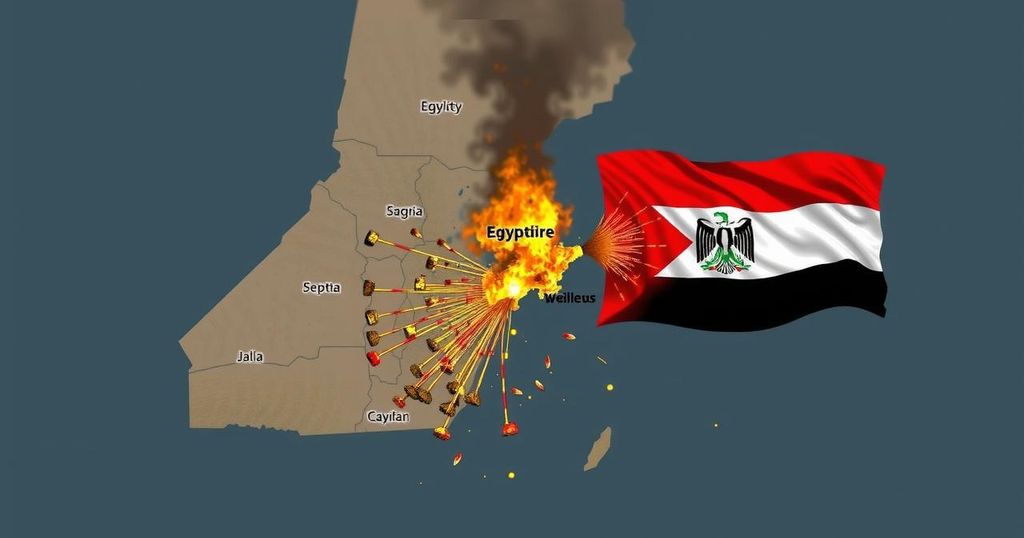Egypt’s Proposal for a Two-Day Ceasefire in Gaza: A Strategic Move for Peace and Negotiation

Egypt has proposed a two-day ceasefire in Gaza, contingent upon Hamas releasing four hostages in exchange for Palestinian prisoners. President Abdel Fattah el-Sisi called for subsequent talks on a permanent ceasefire within ten days. The proposal comes amid ongoing tensions and previous efforts involving mediators like Egypt and Qatar to address hostage situations and broker peace.
On October 27, 2024, Egypt put forth a proposal for a two-day ceasefire in Gaza, suggesting that Hamas release four hostages in exchange for a number of Palestinian prisoners currently incarcerated in Israeli facilities. Egyptian President Abdel Fattah el-Sisi emphasized that this initiative seeks to facilitate progress towards peace, urging that negotiations for a lasting ceasefire should begin within ten days following the implementation of this short-term truce. Although both Israel and Hamas have yet to officially respond to the proposal, a Palestinian official expressed optimism, indicating that Hamas is likely to consider the new terms, albeit the group remains resolute that any accord must ensure the end of the ongoing war and the withdrawal of Israeli troops from Gaza. Israel has consistently maintained that a premature cessation of hostilities could allow Hamas, which has suffered significant losses over the past year, to recover its strength. This diplomatic initiative was announced concurrently with a meeting in Doha involving Mossad Director David Barnea and CIA Director William Burns alongside Qatari Prime Minister Sheikh Mohammed bin Abdulrahman Al Thani, marking the first engagement in discussions regarding ceasefires and hostage situations in two months. Historically, both Egypt and Qatar have played crucial roles as mediators in the ongoing conflict between Israel and Palestinian factions, a role they fulfilled during previous crises, notably the 2014 and 2021 Gaza conflicts. In November 2023, both Egypt and Qatar succeeded in brokering a temporary seven-day ceasefire, which resulted in Hamas releasing 81 Israeli hostages in exchange for 240 Palestinians held in Israeli custody. However, the truce collapsed shortly thereafter due to Hamas’s failure to deliver a list of remaining women and children hostages and its subsequent resumption of rocket attacks on Israel. Currently, out of more than 250 hostages abducted by Hamas on October 7, 2023, 101 remain in captivity. U.S. Secretary of State Antony Blinken asserted that it remains uncertain whether Hamas is prepared to engage in discussions, indicating that more information is anticipated in the forthcoming days.
The proposed ceasefire by Egypt emerges amid heightened tensions and ongoing conflict between Israel and Hamas, which has persisted since the onset of hostilities in October 2023. Historically, Egypt has played an instrumental role in mediating between Israel and Palestinian groups, providing a critical diplomatic channel for negotiation. The recent proposal aims to address the urgent humanitarian concerns in Gaza while promoting a pathway towards a more permanent resolution. The complex dynamics of regional politics, including the influence of Iran and the positions of both Hamas and Israel, complicate these efforts and highlight the delicate nature of ceasefire negotiations in the context of hostages and military operations.
In summary, Egypt’s proposal for a two-day ceasefire in Gaza signifies a crucial step in ongoing mediations between Israel and Hamas, aiming to secure the release of hostages amid a backdrop of intense conflict. While the initiative reflects a desire for peace and stability, significant hurdles remain, particularly with regard to Israel’s security concerns and Hamas’s demands. The outcome of these negotiations will be pivotal in shaping future discussions on a more comprehensive ceasefire and long-term peace.
Original Source: www.fdd.org








